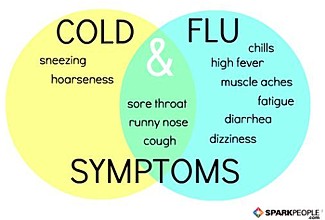CDC Warns of Potentially Severe Flu Season and Urges Vaccinations, Especially For Most At-Risk
 January 9, 2015
January 9, 2015  Kyriaki (Sandy) Venetis
Kyriaki (Sandy) Venetis The Centers for Disease Control and Prevention says early data is suggesting that the current “flu season could be severe” and is recommending immediate vaccination for anyone still unvaccinated, especially for those most vulnerable.

The CDC says those at highest risk include children younger than five years old (especially those younger than two years old); adults ages 65 and older; pregnant women; and people with certain chronic health conditions such as asthma, diabetes, heart and lung disease, and kidney disease.
So far this year, the seasonal influenza A H3N2 viruses have been the most common, and the agency says in past seasons when these viruses have been most common, they have resulted more severe flu symptoms as well as more hospitalizations and deaths.
Another reason for concern is that a number of these viruses have mutated into what are called drift viruses, which means that some genetic changes may make them more resistant to antibiotics.
But, the CDC still recommends vaccinations, because people who get vaccinated will have milder symptoms than those who don’t.
The agency says that, “Depending on the formulation, flu vaccines protect against three or four different flu viruses. Even during a season when the vaccine is only partially protective against one flu virus, it can protect against the others.”
Dr. Joseph Bresee, chief of the influenza epidemiology and prevention branch of the CDC, added that, “Vaccination has been found to provide some protection against drift viruses in past seasons. Also, vaccination will offer protection against other flu viruses that may become more common later in the season.”
The CDC recommends that high risk people check with their doctors as soon as flu symptoms appear, which include: fever, cough, sore throat, runny or stuffy nose, body aches, headache, chills, and fatigue.
The agency adds, “Studies show that flu antiviral drugs work best for treatment when they are started in the 48 hours after symptoms appear.”
The CDC recommends influenza antiviral drugs such as Tamiflu (oseltamivir) and Relenza (zanamivir) which the agency says, “can reduce severe complications” which can result in “hospitalization and potentially death for people who are at high risk.”
The CDC again stresses that treatment of high risk patients should begin as soon as symptoms appear, “without waiting for lab tests to confirm flu infection.”
Reader comments and input are always welcomed!
 flu | tagged
flu | tagged  flu symptoms,
flu symptoms,  flu vaccinations,
flu vaccinations,  flu viruses
flu viruses 
Reader Comments